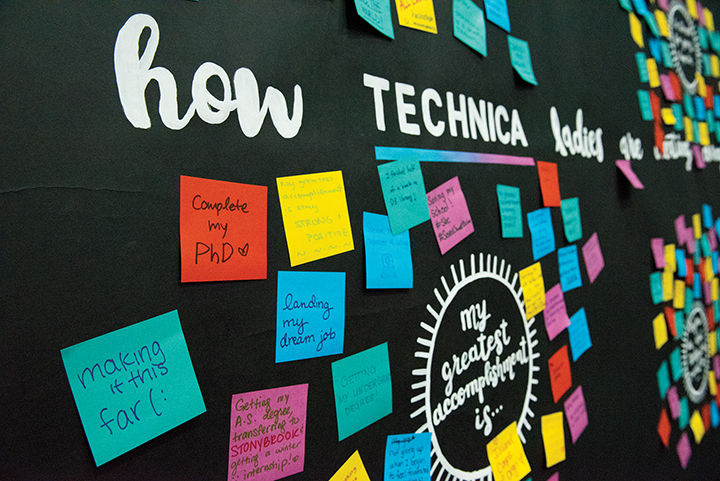Until this year, Technica — the world’s largest all-woman and nonbinary student hackathon — was hosted at the Reckord Armory, where hundreds would crowd together to think up solutions to real-world problems using technology.
But with the coronavirus pandemic continuing to rage around the globe, this event, like so many others, was switched to an entirely virtual format. Far from putting a damper on festivities, though, moving online allowed the competition to balloon in size, even further expanding from last year, when it first welcomed nonbinary students to compete. This year, more than 2,800 people registered for Technica, hailing from every continent in the world besides Antarctica.
The switch to a virtual platform also fell in step with a major theme from this year’s competition, Technica Co-Executive Director Renee Yang said: promoting inclusivity.
“We realized that not all of our hackers would be able to have the same experience,” said Yang, a senior computer science major.
According to a study conducted by Google and Gallup in 2016, while female youth tend to face social barriers learning computer science, racial minorities tend to face structural barriers. For instance, female students are less likely than male students to be told they would be good at computer science compared to their male counterparts — 26 percent of women and 39 percent of men. Meanwhile, only 47 percent of Black students are likely to have computer science classes at their schools, compared to 58 percent of white students, according to the report.
Technica made intersectionality one of the core themes of this year’s event. One of the event’s keynote speakers, Jewel Burks Solomon, heads Google’s Startups team in the United States. A Black woman, she talked about navigating her career trajectory and the financial benefits of promoting diversity.
During the weekend, Technica also created different Slack channels for hackers to connect in based on their shared backgrounds. Political Latinx United for Movement and Action in Society, a student group at this university, held a workshop about the intersection of technology and social justice.
[“Out here by ourselves”: Women aerospace majors are fighting to increase their numbers]
To move the event online, Technica decided to build its own software platform. According to Yang, existing event platforms like vFairs and Cvent were too expensive for the group’s budget. But with the organization creating its own platform, Yang said it was able to work with a smaller operating budget.
This solution, which also involved incorporating Slack and YouTube livestreams, did not come without its issues. The event’s opening ceremony was originally intended to occur via Zoom, but this was later amended to a YouTube livestream. When the stream first started, there was no audio, and after 30 minutes of waiting, the ceremony was moved from its originally 10 a.m. start to 6 p.m.
Despite these initial growing pains, though, participants said they enjoyed their experience this weekend.
Aishwarya Tare, a junior information science major at this university, said Technica’s event this weekend was the best online hackathon she’d been to during the pandemic — and she’s attended four since the coronavirus shutdown began. She praised the event’s setup.
Tare credits Technica as being one of the reasons she decided to come to this university from her hometown of San Jose, California. After she started coding at the age of 11, Tare said she felt tokenized as the only woman on her high school’s robotics team. She wanted to go to college somewhere she could feel supported.
Though Tare had attended Technica two other times before this year, it was Finley Talley’s first time at the hackathon. A junior computer science major at Florida State University, Talley participated in the event from hundreds of miles away.
Talley, who is Black, says one of the major reasons they have “next to no computer science-related things” on their resume is because of their apprehension about entering the white, male-dominated spaces of the tech field. That’s why they wanted to register for Technica, they said.
“I thought I might be able to get some good insight on how to enter the field,” Tally said. “And in general, just how to present myself as a Black, queer femme-presenting person.”
[Neuroscience major set to come to UMD next semester]
The event is sponsored by donors that include major tech companies like Qualcomm, Google and Microsoft, and Tally said they received advice from professors and companies throughout the weekend.
This weekend, Tally worked with a team to develop a web app for sharing and receiving confidential information anonymously. Tally said their app would allow users to select whether the information they were sharing related to issues regarding LGBTQ+ or mental health concerns.
Josh Berenhaus, who graduated from this university in 2014 and now works for Microsoft, volunteered at Technica this weekend, giving hackers the chance to ask about what it’s like to be a software engineer in the real world. Berenhaus said Microsoft offered to pay the university’s nonprofit foundation for the time he volunteered, and he requested that funding be earmarked for Technica.
Berenhaus has been encouraged by the changes he’s seen at Technica over the years.
“Every time I come back, I see more diversity and more people coming to talk to me, and it’s incredible. It’s not just people who look like me,” said Berenhaus, who is a white man. “I’ve definitely seen it get better since I’ve graduated.”



